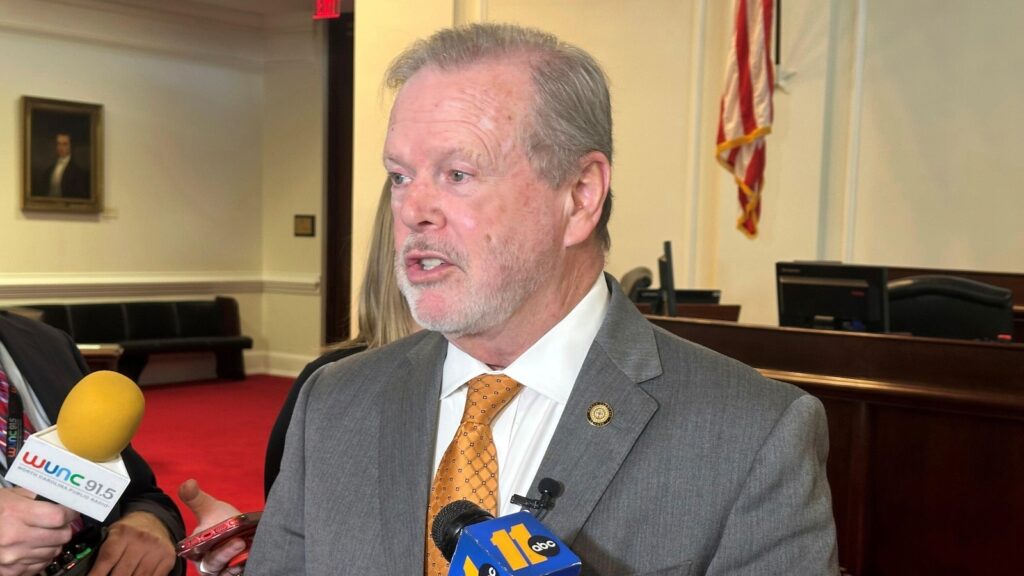[ad_1]
RALEIGH, N.C. — North Carolina legislative Republicans moved closer Monday to enacting a measure that would erode the powers of the incoming governor and other Democratic officials, and also placing on the ballot constitutional amendments that could buttress GOP voting and tax policies.
Along party lines, the GOP-dominated state Senate voted successfully to override Democratic Gov. Roy Cooper’s veto of a bill that in part would weaken Gov.-elect Josh Stein, the next attorney general in Jeff Jackson and other Democrats also elected in November as lieutenant governor and schools superintendent.
Those changes are within a 131-page measure initially approved two weeks ago during a lame-duck session of the General Assembly. Republicans advanced the measure as their current veto-proof majority over Cooper likely will end after this month as Democrats won additional House seats. That will give Stein, who takes office in January, a better chance to use his veto stamp to block successfully bills he opposes.
Cooper vetoed the measure last week, calling the bill a “sham” that does very little financially to help with Hurricane Helene recovery, even as “disaster relief” was included in the bill’s title. He also said provisions altering executive branch powers were unconstitutional. One provision starting in the spring would end the governor’s authority to appoint the State Board of Elections and transfer it to the state auditor, who will now be Republican Dave Boliek.
The bill now returns to the House, where last month three Republicans voted against the measure. Such a margin, if left intact, could scuttle the attempted override expected next week. Senate leader Phil Berger said after Monday’s vote he was confident that House Republicans would have the votes to complete the override. Even then, litigation is possible.
The GOP-controlled legislature has tried to change the election board’s makeup for several years by passing laws that have been blocked by courts, including one last year that would move board appointment authority from the governor to the General Assembly.
As with the Senate’s initial debate on the bill two weeks ago, the chamber gallery was full of bill opponents who call it a Republican power grab after the electorate chose Democrats to top positions in the Nov. 5 elections.
Republicans are “not listening to the voters in North Carolina,” said demonstrator Della Hann, 64, of Southport. “There are checks and balances in government and they need to be respected.”
But Berger said in a news release that the provisions “actually balance our three branches of state government so that North Carolina remains on a positive trajectory, free from Democratic party and liberal activist obstruction.”
Republican Lt. Gov. Mark Robinson, the Senate’s presiding officer, ordered the Senate gallery cleared last month when visitors clapped once too often during a debate on the measure. On Monday, Robinson cleared the gallery again following disruptions after Cooper’s veto message was read and right before the vote.
“Everybody’s got to go,” Robinson said before calling for a 10-minute recess. To avoid potential arrest, protesters left the Legislative Building or quieted down outside the gallery.
Senate Republicans proceeded later to approve in separate bills proposed amendments to the North Carolina Constitution related to photo voter identification and a cap on income taxes.
Each received 30 votes — exactly the number needed for a constitutional referendum. To be placed on ballots statewide in November 2026, these measures still would have to be voted on by the House by the end of the year and receive 72 votes. Constitutional amendments aren’t subject to vetoes.
One proposed referendum would, if approved by a majority of voters, amend the constitution to say all North Carolina voters must show photo identification before voting. The constitution currently only specifies that it’s required for in-person voting. ID exceptions are allowed now and would remain with the amendment. The other referendum would set a rate cap on income taxes at 5%, down from the current 7%.
Individual and corporate income tax rates are currently both below 5% in the state, and state laws separate from the constitution already direct that people voting by mail provide a photocopy of a qualifying identification.
Senate Republicans backing the ID question said it’s important to ensure that all forms of voting will be treated equally going forward as it relates to photo ID, which the GOP successfully got approved in 2018 but didn’t take effect until last year. And with Republicans approving multiple income tax reductions over the years that have boosted the state economy, Cabarrus County Republican Sen . Paul Newton said, it’s time again to let voters decide whether they should remain permanently lower.
Democrats opposed to a lower tax cap say the state is already facing revenue challenges in light of lower tax rates that will make it harder to address major spending needs.
[ad_2]
Source link

